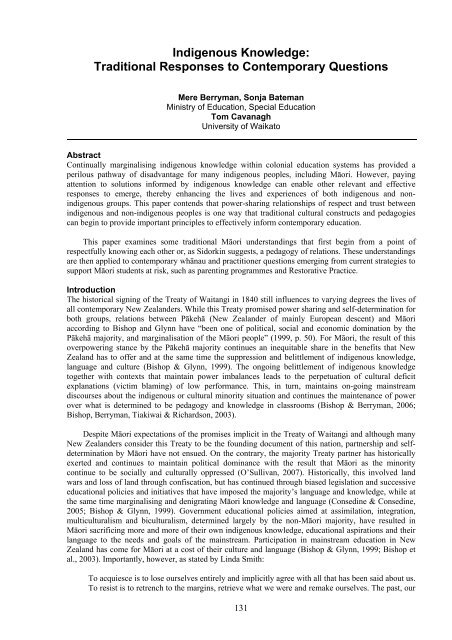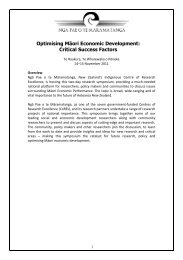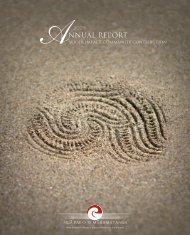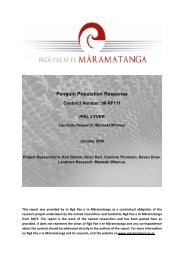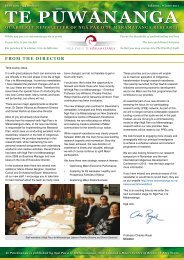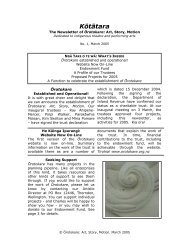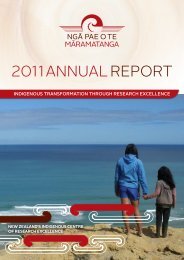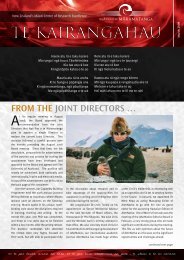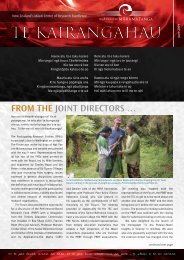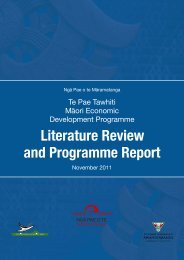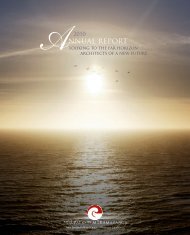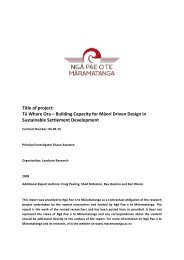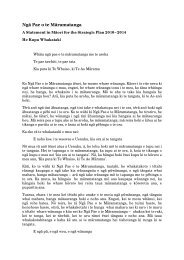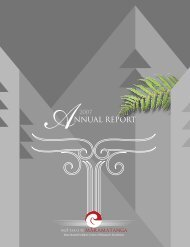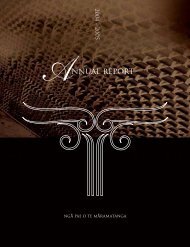traditional knowledge conference 2008 te tatau pounamu
traditional knowledge conference 2008 te tatau pounamu
traditional knowledge conference 2008 te tatau pounamu
You also want an ePaper? Increase the reach of your titles
YUMPU automatically turns print PDFs into web optimized ePapers that Google loves.
Indigenous Knowledge:Traditional Responses to Con<strong>te</strong>mporary QuestionsMere Berryman, Sonja Ba<strong>te</strong>manMinistry of Education, Special EducationTom CavanaghUniversity of WaikatoAbstractContinually marginalising indigenous <strong>knowledge</strong> within colonial education sys<strong>te</strong>ms has provided aperilous pathway of disadvantage for many indigenous peoples, including Māori. However, payingat<strong>te</strong>ntion to solutions informed by indigenous <strong>knowledge</strong> can enable other relevant and effectiveresponses to emerge, thereby enhancing the lives and experiences of both indigenous and nonindigenousgroups. This paper con<strong>te</strong>nds that power-sharing relationships of respect and trust betweenindigenous and non-indigenous peoples is one way that <strong>traditional</strong> cultural constructs and pedagogiescan begin to provide important principles to effectively inform con<strong>te</strong>mporary education.This paper examines some <strong>traditional</strong> Māori understandings that first begin from a point ofrespectfully knowing each other or, as Sidorkin suggests, a pedagogy of relations. These understandingsare then applied to con<strong>te</strong>mporary whānau and practitioner questions emerging from current stra<strong>te</strong>gies tosupport Māori students at risk, such as parenting programmes and Restorative Practice.IntroductionThe historical signing of the Treaty of Waitangi in 1840 still influences to varying degrees the lives ofall con<strong>te</strong>mporary New Zealanders. While this Treaty promised power sharing and self-de<strong>te</strong>rmination forboth groups, relations between Pākehā (New Zealander of mainly European descent) and Māoriaccording to Bishop and Glynn have “been one of political, social and economic domination by thePākehā majority, and marginalisation of the Māori people” (1999, p. 50). For Māori, the result of thisoverpowering stance by the Pākehā majority continues an inequitable share in the benefits that NewZealand has to offer and at the same time the suppression and belittlement of indigenous <strong>knowledge</strong>,language and culture (Bishop & Glynn, 1999). The ongoing belittlement of indigenous <strong>knowledge</strong>together with con<strong>te</strong>xts that maintain power imbalances leads to the perpetuation of cultural defici<strong>te</strong>xplanations (victim blaming) of low performance. This, in turn, maintains on-going mainstreamdiscourses about the indigenous or cultural minority situation and continues the main<strong>te</strong>nance of powerover what is de<strong>te</strong>rmined to be pedagogy and <strong>knowledge</strong> in classrooms (Bishop & Berryman, 2006;Bishop, Berryman, Tiakiwai & Richardson, 2003).Despi<strong>te</strong> Māori expectations of the promises implicit in the Treaty of Waitangi and although manyNew Zealanders consider this Treaty to be the founding document of this nation, partnership and selfde<strong>te</strong>rminationby Māori have not ensued. On the contrary, the majority Treaty partner has historicallyexer<strong>te</strong>d and continues to maintain political dominance with the result that Māori as the minoritycontinue to be socially and culturally oppressed (O’Sullivan, 2007). Historically, this involved landwars and loss of land through confiscation, but has continued through biased legislation and successiveeducational policies and initiatives that have imposed the majority’s language and <strong>knowledge</strong>, while atthe same time marginalising and denigrating Māori <strong>knowledge</strong> and language (Consedine & Consedine,2005; Bishop & Glynn, 1999). Government educational policies aimed at assimilation, in<strong>te</strong>gration,multiculturalism and biculturalism, de<strong>te</strong>rmined largely by the non-Māori majority, have resul<strong>te</strong>d inMāori sacrificing more and more of their own indigenous <strong>knowledge</strong>, educational aspirations and theirlanguage to the needs and goals of the mainstream. Participation in mainstream education in NewZealand has come for Māori at a cost of their culture and language (Bishop & Glynn, 1999; Bishop etal., 2003). Importantly, however, as sta<strong>te</strong>d by Linda Smith:To acquiesce is to lose ourselves entirely and implicitly agree with all that has been said about us.To resist is to retrench to the margins, retrieve what we were and remake ourselves. The past, our131


